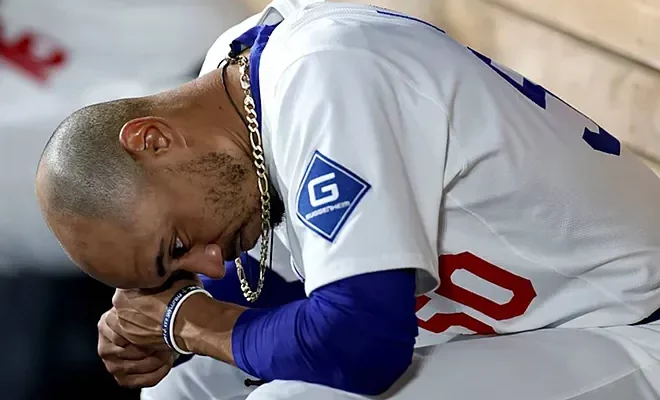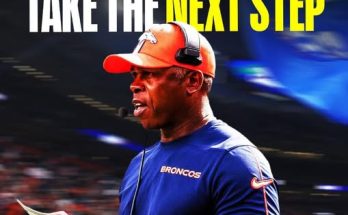Mookie Betts, one of the most gifted and consistent players in Major League Baseball, has never been a stranger to pressure, expectation, and the bright lights of the game. But even the best hitters in the world face periods where nothing seems to click, where every at-bat feels like a battle and every swing fails to produce the desired result. Recently, Betts has found himself in exactly that position, facing a prolonged slump that has tested his patience, confidence, and resolve. Known for his work ethic, meticulous preparation, and analytical approach to the game, Betts admitted that he’s tried every mechanical adjustment, mental trick, and performance tweak he could think of to snap out of it—but nothing has worked. And so, in a move that speaks to both his humility and his belief system, Betts revealed that he’s now turning to God for guidance, saying simply and powerfully, “I’ve tried everything else.”
For an athlete of Betts’ caliber, the decision to speak publicly about his faith at such a vulnerable moment is significant. In an era where professional athletes often feel pressure to project constant confidence and avoid showing cracks in their armor, Betts’ candor offers fans a rare glimpse into the mental and emotional side of the game. It’s easy for spectators to see the polished highlight reels and stat lines, but baseball is a sport that can humble even the greatest players in an instant. A slump is not just about a lower batting average—it’s about the weight of missed opportunities, the quiet frustration that builds over days and weeks, and the constant internal questioning of “What am I doing wrong?”
For Betts, whose career has been defined by consistency, adaptability, and clutch performance, the slump came as an unwelcome reminder of baseball’s unforgiving nature. Over the course of the season, he’s faced sequences of pitches that seem to be tailor-made to exploit the smallest flaw in his swing. Pitchers have attacked him with a mix of high-velocity fastballs, breaking balls just out of the strike zone, and well-placed changeups, daring him to adjust. And while Betts has made micro-adjustments to his stance, swing path, and timing, the results have not matched the effort. The frustration reached a point where, by his own account, every possible baseball fix had been tried and tested—only to lead to the same outcome.
Turning to faith in such moments is not uncommon for athletes, but Betts’ choice to share that step with the public adds a layer of authenticity to his story. It’s a reminder that for many players, the game is not just physical and technical—it’s deeply mental and, for some, spiritual. By seeking guidance from God, Betts is shifting his focus from solely controlling the outcome to finding peace and perspective in the process. In doing so, he’s tapping into a mindset that countless athletes before him have credited for helping them persevere through their most challenging stretches.
Betts has long been known for his positive demeanor and leadership presence in the clubhouse. Even during slumps, he makes a point to stay engaged with his teammates, keep morale high, and contribute in other areas, whether it’s through defense, base running, or simply being a calming voice in the dugout. This latest chapter in his career adds depth to that leadership—showing that resilience is not just about pushing harder, but about knowing when to lean on something bigger than yourself. For some, that’s family; for others, it’s meditation or mental skills training. For Betts right now, it’s faith.
His journey through this slump has sparked conversations among fans and analysts about the role of mental and spiritual health in baseball. Unlike sports that are more physically relentless, baseball allows space between plays and at-bats for the mind to wander—and sometimes overthink. The mental grind of a slump can feel heavier in this sport because the feedback loop is slower. You might only get four or five chances in a game to turn things around, and if each one ends in frustration, you carry that weight into the next day. Betts’ acknowledgment that he’s “tried everything else” and is now turning to God underscores how cyclical and stubborn slumps can be, and how solutions are not always purely mechanical.
Fans have responded to Betts’ openness with a mix of encouragement, empathy, and admiration. Many see it as a refreshing display of vulnerability from a player who could have easily kept his struggles and coping strategies private. Others, particularly those who share his faith, view it as an inspiring testament to leaning on spiritual guidance during difficult times. Social media has been filled with messages of support, Bible verses, and reminders that even the greatest athletes need reassurance and renewal from time to time.
From a baseball standpoint, there’s reason to believe Betts can and will rebound. His track record is too strong, his skill set too well-rounded, and his competitive drive too intense to stay down for long. Slumps often end as suddenly as they begin—a single well-struck ball, a seeing-eye single, or a clutch home run can flip the switch. But beyond the statistics and mechanics, Betts’ story right now is about perspective. Whether this spiritual turn directly leads to a breakout or simply helps him find peace in the struggle, it’s a reminder that baseball is as much about managing the valleys as it is about enjoying the peaks.
In the Dodgers’ clubhouse, his teammates have continued to express confidence in him. Manager Dave Roberts has reiterated that Betts remains an integral part of the lineup, slump or not, and that his value extends far beyond his batting line. The Dodgers’ success has always been about the collective effort, but having Betts at his best is undeniably a huge boost. Roberts’ support, coupled with Betts’ decision to ground himself in faith, paints a picture of a player who is not retreating from the challenge but approaching it from a different angle.
One of the most striking aspects of Betts’ statement is its honesty. Professional athletes often default to cliché answers about “trusting the process” or “taking it one day at a time” when discussing struggles. Betts’ admission that he’s exhausted every baseball-based fix and is now seeking divine help stands out because it strips away the filter. It says: I am human, I am frustrated, and I’m willing to turn to something greater than myself to find the strength to move forward. That level of honesty resonates not just with fans of the Dodgers, but with anyone who has faced a moment in life where all the usual solutions stopped working.
As the season moves forward, Betts’ journey out of this slump will be closely watched—not just for its impact on the Dodgers’ playoff push, but for what it reveals about the mindset of one of baseball’s most respected stars. If he finds his rhythm again and goes on a tear, his story will become a narrative of faith, persistence, and the power of seeking help beyond oneself. If the struggle lingers, it will still stand as a testament to the idea that our worth is not defined solely by output, but by the courage to confront difficulties head-on and with humility.
For now, Betts remains committed to doing everything in his power—physically, mentally, and spiritually—to find his way back to the level of play fans have come to expect from him. In baseball, there are no guarantees. A slump can last days or weeks, and sometimes the game has a way of humbling you just when you think you’ve figured it out. But Betts has taken a step that transcends the sport, one that suggests he’s seeking not only a return to form but a deeper sense of peace with the process. In the unpredictable, often unforgiving game of baseball, that might be just as valuable as any mechanical adjustment.
Whether this chapter ends with a dramatic resurgence or simply a quieter kind of breakthrough, Mookie Betts’ decision to turn to God during a trying time adds a human dimension to his superstar status. It reminds us that even the brightest lights in the game are carried by faith, hope, and the willingness to admit when they need something more than their own strength. For Betts, the next great swing might come not just from the bat in his hands, but from the belief in his heart.


